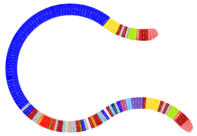Research
Macrobiome Therapeutics is developing next-generation biologics for treating disorders that result from a dysfunctional immune system. Our drug discovery ethos is underpinned by millennia of host-parasite co-evolution. Parasitic worms have evolved to survive in their vertebrate hosts while causing minimal pathology, a relationship that has been fine tuned for millions of years. We are harnessing the therapeutic potential of parasites to develop the next generation of biologics inspired by nature”.
Key publications:
-
Novel anti-inflammatory biologics shaped by parasite-host coevolution.
-
A netrin domain-containing protein secreted by the human hookworm Necator americanus protects against CD4 T cell transfer colitis
-
Suppression of inflammation and tissue damage by a hookworm recombinant protein in experimental colitis
-
Hookworm excretory/secretory products induce interleukin-4 (IL-4)+ IL-10+ CD4+ T cell responses and suppress pathology in a mouse model of colitis
Inflammatory Bowel Disease (IBD)
This paper details the biodiscovery pipeline used to identify novel anti-inflammatory drug leads from the dog hookworm secretome. A high-throughput screen was used to filter the 91 candidate proteins for efficacy in a mouse model of IBD(colitis), and positive “hits” were screened for immunosuppressive activity against human IBD patient gut immune cells, identifying 4 promising new leads for colitis.
DOI: 10.1016/j.trsl.2021.02.012
Describes the discovery and pre-clinical testing of a novel recombinant protein treatment for colitis in mice. This protein called Na-AIP-1, derived from the human hookworm Necator americanus, could suppress acute and chronic models of colitis in mice, and suppress inflammatory cytokine secretion by human T cells.
Examines the protective efficacy of a recombinant protein from the canine hookworm Ancylostoma caninum (AIP-1) in a mouse model of colitis. AIP-1 treatment was efficacious at reducing disease severity and suppressed intestinal pro inflammatory cytokine responses.
This study demonstrates that treatment of mice with natural, crude mixtures of hookworm excretory-secretory(ES) proteins is effective at reducing disease in a mouse model of colitis.
-
Gastrointestinal Helminth Infection Improves Insulin Sensitivity, Decreases Systemic Inflammation, and Alters the Composition of Gut Microbiota in Distinct Mouse Models of Type 2 Diabetes
-
Administration of Hookworm Excretory/Secretory Proteins Improves Glucose Tolerance in a Mouse Model of Type 2 Diabetes
Type 2 Diabetes
DOI: 10.3389/fendo.2020.606530
This paper shows that treatment with a rodent hookworm species is able to improve metabolic health in mice fed a Type 2 diabetes-inducing high fat diet or a high carbohydrate diet. Protection from disease was associated with induction of a Type 2 immune response and expansion of eosinophils and alternatively-activated macrophages.
This study demonstrates that the beneficial effects of live hookworms in mouse models of Type 2 diabetes can be recapitulated by treatment with worm excretory secretory proteins alone.
-
Development of a Potent Wound Healing Agent Based on the Liver Fluke Granulin Structural Fold
-
Structural Variants of a Liver Fluke Derived Granulin Peptide Potently Stimulate Wound Healing
Wound Healing
DOI: 10.1021/acs.jmedchem.7b00047
This study describes how the bioactive region of a wound healing granulin protein derived from the liver fluke Opisthorchis viverrini was identified, and produced as a peptide product. The peptide was highly potent at promoting human cell prolife ration and healing wounds in a mouse model-therefore representing a more convenient to produce and less immunogenic product for healing wounds than the full-length granulin protein.
-
Hookworm recombinant protein promotes regulatory T cell responses that suppress experimental asthma
-
Na-AIP-1 secreted by human hookworms suppresses collagen-induced arthritis
-
Harnessing helminth-driven immunoregulation in the search for novel therapeutic modalities
Other inflammatory Diseases
DOI: 10.1126/scitranslmed.aaf8807
This study reports the suppression of asthma in mice by a novel recombinant protein derived from the canine hookworm Ancylostoma caninum(AIP-2). AIP2 was shown to have a distinct mechanism of action involving interactions with tolerogenic dendritic cells and expansion of regulatory T cells.
DOI: 10.1007/s10787-021-00909-5
Details the efficacy of the hookworm protein Na-AIP-1, which was previously shown to be protective in IBD, in a mouse model of collagen-induced arthritis, when delivered as a monotherapy or in combination with methotrexate.
DOI: 10.1371/journal.ppat.1008508
A review article that summarises the state of the literature and future prospects regarding helminth product-derived treatments for a range of inflammatory and metabolic diseases.
